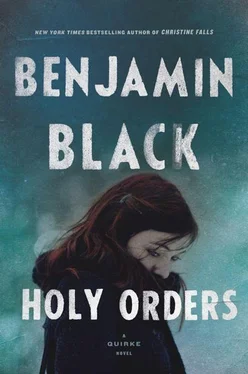“Was Jimmy doing a story on them?”
“Could be,” Hackett said. “Could be.”
He veered off suddenly and crossed the road, ignoring a single-decker bus that parped its horn at him angrily. Quirke followed when the bus had passed. They went into the Ormond Hotel. Hackett took off his hat and wiped the band inside it with the tail of his tie.
In the deserted bar the wooden floor had been recently washed, and there was a watery odor in the air and a slick smell of soap suds. The morning look of the place, sweetly melancholy, warmed Quirke’s already warming heart. Everything would be all right; everything would be fine.
An elderly curate in a long and dirty apron, rheum-eyed and stooped, came in by a far door. “Not serving yet, gents,” he said, then looked more closely and recognized Hackett. “Ah, Inspector, ’tis yourself!”
“Morning, Jamesey,” Hackett said. “We were passing by and to our surprise discovered we had a thirst. This is my friend and colleague Dr. Quirke. He’ll take a ball of malt, I’m sure, to cut the phlegm.”
Jamesey hobbled across and peered out into the lobby, then shut the door and, returning, lifted the counter flap and went behind the bar. “You’ll get me sacked yet, so you will,” he said to Hackett, taking down glasses and uncorking a bottle of Jameson.
“Ah, now, Jamesey,” Hackett said, and winked at Quirke, “don’t say things like that — sure, what would they do without you?”
Jamesey set the drinks before them, but when Quirke took out his wallet to pay the old man lifted a staying hand. “Hospitality of the house, and not a word,” he said. “If I take your money I’m breaking the law of the land, a thing I’d never do.”
“Good man,” Hackett said, and lifted his glass. “Here’s health and long life to us all.”
Quirke drank, and reflected, not for the first time, that few things tasted so sweet and yet so dangerous as whiskey in the morning.
“So, what have we?” Quirke said, when Jamesey had gone off about his chores. “We have the priest, and this tinker. What’s the connection?”
“Father Honan has done work among the traveling folk,” Hackett said. “Maybe he came across Packie the Pike. That would be an ill-assorted pair.”
“Was there anything else in Jimmy’s notes?”
“Ordinary stuff, the usual. It was the name that caught my eye. Packie Joyce is well known to the forces of the law. Maybe it’s with him we should be having a word.”
Outside, a cloud shifted and sunlight bloomed damply on the frosted window. They could hear the sound of traffic on the quay, and even, faintly, the voices of gulls. Quirke caught himself thinking how strange it was to be here; how strange to be anywhere.
Hackett was toying with his empty glass. “What do you think?” he said. “Will we risk another?” He called towards the door, “Jamesey!” then looked thoughtfully at his hat on the bar. “Aye,” he said. “A word in the ear of Packie the Pike might be the thing, all right.”
Phoebe had slept badly and woke in the morning feeling fatigued and headachy. She got up and opened the curtains but then climbed back under the covers again and pulled them over her head. She would telephone the shop and say she was sick. Mrs. Cuffe-Wilkes would grumble, of course, but she did not care. She lay on her side with a hand under her cheek and looked out the window, watching scraps of cloud scud across a china-blue sky. The wind must be high today.
She was restless, as if a storm were blowing through her, too, yet at the same time a strange torpidity of mind weighed on her. She was sharply aware of the presence of Sally Minor, sleeping in the next room. Or maybe she was not asleep; maybe she, too, was awake and watching the sky and feeling this same sense of hindered agitation. What must it be like for her, coming to consciousness each morning and remembering yet again her brother’s death and the cruel circumstances in which he had died? Would grief for a brother be the same as grief for a parent, or for a lover? She did not think so. Yet who was she to say? She had no siblings to lose. She was not sure that she had a lover, either.
She realized that since she had woken she had been listening for sounds from the other room. Eventually they would both have to get up and begin coping with the day. What would they say to each other, what would they find to talk about? Would they have breakfast together? Phoebe was not sure that there was anything to eat. She was not very good at keeping house; she had no interest in it. She rarely ate more than one meal a day, and that she ate out, in the Country Shop if it was lunchtime or, at nighttime, at that place in Baggot Street, on the other side of the bridge, where they served Italian food, or what passed for it, anyway …
She caught herself up. She knew what she was doing: she was putting off the moment when she would have to face Sally. She should hop out of bed now and put on her dressing gown and go out to the front room and say to her — what? What would she say? The very thought of Sally made her fingers tighten on the edge of the sheet as if it were the sail of a capsized boat and she had nothing else to cling to.
In the end, however, it was all simple and perfectly natural. She had crept down to the bathroom — it was one flight down, on the return — and made herself lie in the tub for a quarter of an hour, and in the heat and the hazed air her mind had grown calm and her nerves had stopped twitching. What was there to be agitated about, after all? When she had dressed she went into the kitchen and Sally was there, sitting at the table by the window, hunched over a mug of tea. Her face was puffy from weeping, the shine of her hair was dulled, and there was a speck of sleep at the inner corner of her left eye. She was just a girl after all, ordinary, and ordinarily vulnerable, and certainly not the momentous presence she had seemed when Phoebe had approached her in the darkness last night and touched the copper filaments of her hair and felt the electric current coursing through them.
“Good morning!” Phoebe said. “How are you? Did you get to sleep in the end?” Her tone sounded callously bright to her own ear, and she tried to amend it. “Would you like some breakfast?”
“Thanks,” Sally said. “I’m not hungry.”
“Oh, do have something.”
Phoebe searched through the cupboards and the fridge, and was surprised to find that there was half a Procea loaf, nearly fresh, and milk and sugar, too, and even a pot of marmalade that she could not remember buying but that looked all right. She put all this on the table, but Sally only looked at it wanly and turned her face away. It was raining outside now, and the brownish light falling in at the window gave a grainy cast to her skin. “You should eat,” Phoebe said. “Will I make some toast for you?”
Sally had been looking down into the street, and now she rose a little way from her chair and put her face closer to the glass. “Do you know that man?” she asked.
Phoebe went and stood beside her and looked where she was pointing. The man was standing on the other side of the street, by the railings above the towpath, under the dripping trees. He wore a sheepskin jacket and a cloth cap pulled low over his eyes. He was smoking a cigarette, cupped in the palm of his hand to protect it from the rain. “I don’t know who he is,” Phoebe said. “He’s just some man, I think. Why?”
“I don’t know. He looked familiar. I thought I might have seen him somewhere before.”
The man dropped the butt of his cigarette on the pavement and trod on it, then pulled up the fleece collar of his jacket and set his shoulders and walked off in the direction of Baggot Street. Sally craned sideways to watch him go. Then she sat back on her chair and sighed, and wrapped her hands around the mug to warm them. “I’m sorry,” she said. “Since James died, everyone I see seems to be acting suspiciously. It’s just nerves, I suppose. Only…”
Читать дальше












